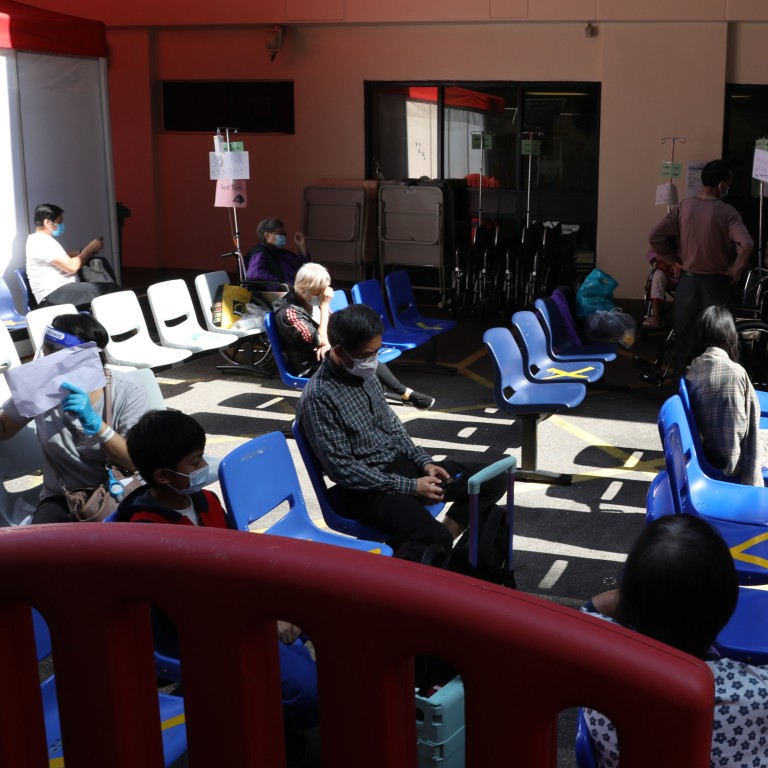
Hong Kong health experts warn numbers will not be falling any time soon as city reports 26,908 Covid-19 cases and 286 deaths
- Professor Lau Yu-lung, who chairs government committee on vaccines, says infections have plateaued and will remain steady for three to six weeks
- Kwok Kin-on, assistant professor at Chinese University’s School of Public Health, estimates roughly 5 million residents will be infected by June
A total of 14,868 cases were logged through a new online government portal by residents using at-home rapid antigen tests, in addition to 12,040 confirmed through polymerase chain reaction screenings, bringing the daily total to 26,908.
Hong Kong’s overall Covid-19 tally stood at 733,785, including 721,154 cases logged during the fifth wave, or 98 per cent of the total.
Meanwhile, the Hospital Authority reported a record 249 coronavirus-related fatalities in the past 24 hours, involving patients aged between 39 and 105. Of those, 165 had no vaccination records, 41 had received one dose, 39 had two and four had three.
Another 37 people, aged 64 to 106, died earlier but were only reported on Monday due to a backlog. The number of Covid-related fatalities stood at 4,279.
Dr Chuang Shuk-kwan of the Centre for Health Protection urged the public to remain vigilant and avoid going out as much as possible.
“The case numbers are still high … if we are not careful and the flow of people is high and everyone relaxes, then there is a chance the caseload will rebound,” she said.
Coronavirus: 75 mainland medical workers to arrive in Hong Kong on Monday
Residents should not expect the number of infections to drop in the near future, health experts warned. Professor Lau Yu-lung, who chairs the government’s Scientific Committee on Vaccine Preventable Diseases, said he believed local infections – fuelled by the more contagious Omicron variant – had plateaued, and would remain steady for three to six weeks before coming down again.
“It is going to take a long time for the number of cases to come down. People will continue to live in a state of confusion and worry for a while,” he told a radio programme, citing the experience of Singapore, where daily infections hovered around 10,000 for a month before declining.
Kwok Kin-on, an assistant professor at Chinese University’s School of Public Health, estimated that roughly 5 million of the city’s 7.4 million residents would be infected within six months of the start of the fifth wave in late December, while the death toll would reach 7,000.
The modelling assumed that current social-distancing rules would remain in place and only 30 per cent to 40 per cent of residents would report their infections to authorities.
Hong Kong labour chief pushes for sick leave for quarantined residents
The daily number of infections would not drop into the four digits until late May and would only return to the 100 mark about a month later, he added.
But even with 5 million people infected, the city would still not reach herd immunity given vaccines were not 100 per cent effective, antibodies would decline over time, and the possible emergence of other variants, he told the Post.
“We may see anti-epidemic fatigue in the community, as the public appears to become less alert after they are vaccinated or infected,” he told the same programme, adding that he was nonetheless “optimistic” that cases would not spike again in the coming weeks.
Kwok said strict social-distancing measures could only be gradually relaxed once infections were back in the four-digit range. Easing the current ban on seating more than two patrons per table in restaurants would be an appropriate starting point, he argued.
Lau also said his committee now believed that people with healthy immune systems who had received at least two doses of a Covid-19 vaccine before becoming infected enjoyed “hybrid immunity” and would not have to get any more shots after recovering.
“Having an infection once is equal to being vaccinated with one dose of vaccine,” he said, citing overseas studies. “Such hybrid immunity is even more effective than vaccination [alone]. It’s more all-around and long-lasting.”
However, he warned residents not to expose themselves to the risk of infection in a bid to acquire hybrid immunity, as Covid-19 was still a life-threatening illness.
In response to Kwok’s study, Chuang said she had no estimation on the number of people not reporting their positive cases through rapid tests, but urged the public to do so for authorities to understand the actual situation in the community.
Covid-19 vaccination teams to visit ‘all Hong Kong care homes by Friday’
Meanwhile, acting home affairs minister Jack Chan Jick-chi revealed that a fourth call centre for handling Covid-related medical inquiries would be set up, increasing the number of telephone lines dedicated to the effort from 280 to 550. The hotlines serve more than 10,000 callers every day.
A mobile app for patients would also be launched in the coming days for residents to make inquiries with the centres, he added.
Separately, Hongkong Post also announced 14 of its branches across the city closed on Monday for disinfection after some employees tested positive for Covid-19. The affected post offices include ones in Sheung Wan, Happy Valley and Stanley.
In a bid to further ease the burden on public hospitals, the private Union Hospital said its number of beds for non-Covid patients transferred by the Hospital Authority, such as those requiring services in paediatrics and non-urgent surgeries, would be increased to 80 from 50.



